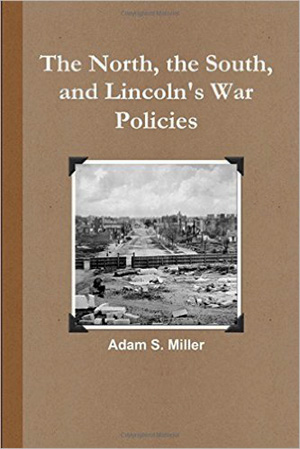Book reviews
 |
 |
 |
 |
 |
 |
 |
A Dictator Called Abraham Lincoln
Book review of The North, the South and Lincoln’s War Policies, Book III, by Adam S. Miller, Monrovia, MD: Tower of David/Marian Pub., Inc., 2015, 196 pp.
“Our work has been the next thing to annihilation. … In the record of wars we read of vast armies marching through an enemy’s country, carrying death and destruction in their path… History, however, will be searched in vain for a parallel to the scathing and destructive effect of the invasion of the Carolinas”
- Northern Major George W. Nichols, staff officer to Gen. Sherman
- Northern Major George W. Nichols, staff officer to Gen. Sherman
While studying the latter half of the book The North, the South and Lincoln’s War Policies, I was reminded of the words of Our Lord: “By their fruits you shall know them.” With this moral criterion we can scrutinize the actions of Lincoln, disregarding his lofty and duplicitous rhetoric, to get an image of what kind of man he really was. What emerges is an image in stark contrast to the humanitarian savior of our nation that Lincoln is so often titled.
On top of the diplomatic maneuvering and deception that allowed Lincoln to secure his casus belli at Fort Sumter, Miller presents numerous examples of Lincoln’s duplicity in dealing with his own people in the North. In blatant disregard for the constitutional limitations placed on the Executive Power of the government, Lincoln would inaugurate what was effectively an American Police State.
Lincoln began by calling up troops in direct violation of constitutional law, which grants such powers only to Congress. Following this, he suspended the writ of habeas corpus, which is a legal instrument protecting the citizen from an arbitrary imprisonment and gives him the right of a fair trial. The power to suspend this law is also only granted to Congress. Accordingly, when Maryland Chief Justice Roger Taney struck down Lincoln’s action, the President simply ignored him and continued to imprison opposition.
This was an usurpation of the Judicial Power by the Executive Power, which, along with the Legislative Power, constitute the three branches of our representative regime. In this way, Lincoln clamped down on anybody who opposed him, resulting in the imprisonment of at least 13,000 and possibly as many as 30,000 Northern civilians over the course of the war for no crime whatsoever. The few who were given the chance at a trial found themselves before military kangaroo courts, again a breach of law that mandates civilians must be tried before civil courts.
The profile of a dictator
Every law Lincoln broke he did on the slippery-slope of “necessity.” Newspapers were shut down, journalists were arrested and in many places martial law was declared. Lincoln would tell a city or state official one thing and then do another, such as when he promised the Mayor of Boston that no troops would pass through his city and, then, proceeded to bring in federal troops, place the city under martial law and search all houses to confiscate any armaments held by the population.
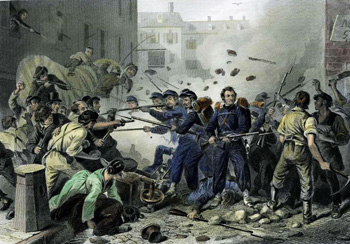 The State of Maryland had much sympathy for the South, so to ensure state ‘loyalty’ Lincoln ordered the arrest of the Mayor and Police Marshall of Baltimore, over 30 Maryland state legislators and a Maryland congressman. In New York the “Union Vigilance Committee” was established, which set up a system of citizen-spies and secret police that targeted anybody holding even vaguely anti-Federalist or anti-Lincoln opinions.
The State of Maryland had much sympathy for the South, so to ensure state ‘loyalty’ Lincoln ordered the arrest of the Mayor and Police Marshall of Baltimore, over 30 Maryland state legislators and a Maryland congressman. In New York the “Union Vigilance Committee” was established, which set up a system of citizen-spies and secret police that targeted anybody holding even vaguely anti-Federalist or anti-Lincoln opinions.
In the re-election campaign of 1864, Lincoln even dispatched troops and cannons to New York to prevent “secessionist elements” from having the chance to vote against him. In the contested State of Missouri whole counties that harbored any secessionist sympathies were literally expelled from their homes, which were then burned, leading many Missourians to cast their lot in with the Confederacy.
Even the most prominent members of the government were not exempt, as seen when Lincoln’s most outspoken critic, Ohio representative Clement Vallandigham, was arrested by soldiers in his own home in the middle of the night. He was deported to Confederate territory and later fled to Canada.
Violences of every kind
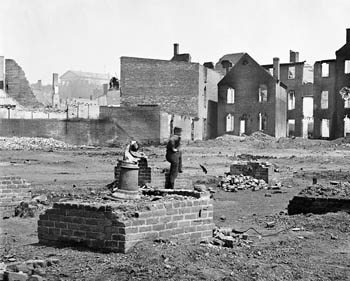
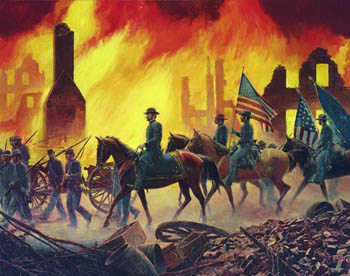 While Lincoln was strangling dissent in the North, the orders given to his generals for their invasion of the South leave absolutely no doubt as to the despotic and inhumane nature of his administration. In order to more quickly crush the outnumbered South and force subservience to his government, Lincoln ordered a scorched earth policy, destroying huge swaths of Southern land and property. Some towns were so thoroughly destroyed that they were literally wiped off the map, remaining uninhabited wildernesses to this day.
While Lincoln was strangling dissent in the North, the orders given to his generals for their invasion of the South leave absolutely no doubt as to the despotic and inhumane nature of his administration. In order to more quickly crush the outnumbered South and force subservience to his government, Lincoln ordered a scorched earth policy, destroying huge swaths of Southern land and property. Some towns were so thoroughly destroyed that they were literally wiped off the map, remaining uninhabited wildernesses to this day.
As the Northern generals fought their way through the South many of them received direct orders to make the countryside uninhabitable, not excluding the great cultural centers of the South. Alexandria, a Louisiana city captured by the North, for example, was burned without notice to the resident population. Civilian hostages were routinely held and executed for any military reaction against Northern soldiers. The number of civilian lives lost to starvation and exposure resulting from the devastation remain incalculable to this day.
Lincoln was aware of the barbarism but did not care about it. He reinstated and even promoted some generals who had been court-martialed for many criminal atrocities against civilians. Other generals received telegrams from Lincoln or his government applauding them for the damage they inflicted on the beleaguered Southern people.
Participation of communists
It is of historical interest, particularly to us Catholics, to note that many of the soldiers and officers who perpetrated these war-time atrocities had a special ideological background. Lincoln’s army and officer corps had, in fact, a large quantity of communist revolutionaries, who had fled to America following their failed European uprisings of 1848.
These men, hateful towards the Catholic Religion and Christian Civilization, saw the war as an opportunity to implement their Marxist ideals via a totalitarian government overcoming the organic local rule of the Southern States. As many as one-fourth of the officers, and nearly as many rank-and-file soldiers, fit this criterion and, Miller notes, numerous were also members of Freemasonry. Many of these officers were responsible for situations where soldiers committed atrocities against Southerners, showing the true colors of those who espouse the ideals of liberté, egalité, fraternité.
The degree to which Lincoln’s government and military were permeated with early communist partisans is significant but is beyond the scope of this review to fully document. Suffice it to say that Marx and Engels looked to the Northern cause with great interest. The North in large part was implementing the Marxist ideals of an industry-based economy, a strong central government and the repression of local and organic rule.
It is noteworthy that Karl Marx himself signed a letter from the First International Communist – The International Workingmen Association – congratulating Lincoln on his reelection in 1864. This Northern association with Communism is interestingly neglected from most conventional history books.
A war of staggering impact
Miller’s book achieves its goal of exposing the iniquitous conduct of Lincoln and the North. Such a record of infamy has been suppressed to paint the victors in the most positive light possible. Unfortunately, historians who try to bring up these points are labeled “neo-confederates,” a term carrying strongly negative connotations in academia and the media.
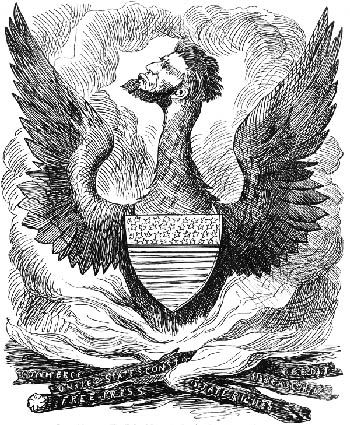 Murder, rape and destruction fell upon the South’s population per Lincoln’s orders. His flagrant and illegal usurpation of constitutional authority, the corruption of his administration and his brutal repression of any sign of opposition are too vast to be fully documented in Miller’s book, let alone in this article.
Murder, rape and destruction fell upon the South’s population per Lincoln’s orders. His flagrant and illegal usurpation of constitutional authority, the corruption of his administration and his brutal repression of any sign of opposition are too vast to be fully documented in Miller’s book, let alone in this article.
Despite this, The North, The South and Lincoln’s War Policies offers a condensed delivery of factual information showing the truth behind the diplomatic dishonesty, repression of civil liberties and war-time crimes against humanity that were both instigated and approved by Lincoln and those under him.
With the evidence presented in this book one cannot assent to see Lincoln as the great humanitarian that so many history books depict him to be. Taken as a whole, this series of small books by Miller offers a much needed scrutiny of the War for Southern Independence. I highly recommend my readers to study the series.
It is my hope that it will open the door to a more frank and honest discussion of this crucial conflict in our American History and that we, as a people, will not shy away from the infamous facts surrounding one of our most wrongly beloved historical figures.

On top of the diplomatic maneuvering and deception that allowed Lincoln to secure his casus belli at Fort Sumter, Miller presents numerous examples of Lincoln’s duplicity in dealing with his own people in the North. In blatant disregard for the constitutional limitations placed on the Executive Power of the government, Lincoln would inaugurate what was effectively an American Police State.
Lincoln began by calling up troops in direct violation of constitutional law, which grants such powers only to Congress. Following this, he suspended the writ of habeas corpus, which is a legal instrument protecting the citizen from an arbitrary imprisonment and gives him the right of a fair trial. The power to suspend this law is also only granted to Congress. Accordingly, when Maryland Chief Justice Roger Taney struck down Lincoln’s action, the President simply ignored him and continued to imprison opposition.
This was an usurpation of the Judicial Power by the Executive Power, which, along with the Legislative Power, constitute the three branches of our representative regime. In this way, Lincoln clamped down on anybody who opposed him, resulting in the imprisonment of at least 13,000 and possibly as many as 30,000 Northern civilians over the course of the war for no crime whatsoever. The few who were given the chance at a trial found themselves before military kangaroo courts, again a breach of law that mandates civilians must be tried before civil courts.
The profile of a dictator
Every law Lincoln broke he did on the slippery-slope of “necessity.” Newspapers were shut down, journalists were arrested and in many places martial law was declared. Lincoln would tell a city or state official one thing and then do another, such as when he promised the Mayor of Boston that no troops would pass through his city and, then, proceeded to bring in federal troops, place the city under martial law and search all houses to confiscate any armaments held by the population.

Confederate sympathizers rebelled against forced conscription by Northern troops - Baltimore, 1861
In the re-election campaign of 1864, Lincoln even dispatched troops and cannons to New York to prevent “secessionist elements” from having the chance to vote against him. In the contested State of Missouri whole counties that harbored any secessionist sympathies were literally expelled from their homes, which were then burned, leading many Missourians to cast their lot in with the Confederacy.
Even the most prominent members of the government were not exempt, as seen when Lincoln’s most outspoken critic, Ohio representative Clement Vallandigham, was arrested by soldiers in his own home in the middle of the night. He was deported to Confederate territory and later fled to Canada.
Violences of every kind

Remains of Richmond after Lincoln’s brutal scorched earth policies; below Sherman burning the South

As the Northern generals fought their way through the South many of them received direct orders to make the countryside uninhabitable, not excluding the great cultural centers of the South. Alexandria, a Louisiana city captured by the North, for example, was burned without notice to the resident population. Civilian hostages were routinely held and executed for any military reaction against Northern soldiers. The number of civilian lives lost to starvation and exposure resulting from the devastation remain incalculable to this day.
Lincoln was aware of the barbarism but did not care about it. He reinstated and even promoted some generals who had been court-martialed for many criminal atrocities against civilians. Other generals received telegrams from Lincoln or his government applauding them for the damage they inflicted on the beleaguered Southern people.
Participation of communists
It is of historical interest, particularly to us Catholics, to note that many of the soldiers and officers who perpetrated these war-time atrocities had a special ideological background. Lincoln’s army and officer corps had, in fact, a large quantity of communist revolutionaries, who had fled to America following their failed European uprisings of 1848.
These men, hateful towards the Catholic Religion and Christian Civilization, saw the war as an opportunity to implement their Marxist ideals via a totalitarian government overcoming the organic local rule of the Southern States. As many as one-fourth of the officers, and nearly as many rank-and-file soldiers, fit this criterion and, Miller notes, numerous were also members of Freemasonry. Many of these officers were responsible for situations where soldiers committed atrocities against Southerners, showing the true colors of those who espouse the ideals of liberté, egalité, fraternité.
The degree to which Lincoln’s government and military were permeated with early communist partisans is significant but is beyond the scope of this review to fully document. Suffice it to say that Marx and Engels looked to the Northern cause with great interest. The North in large part was implementing the Marxist ideals of an industry-based economy, a strong central government and the repression of local and organic rule.
It is noteworthy that Karl Marx himself signed a letter from the First International Communist – The International Workingmen Association – congratulating Lincoln on his reelection in 1864. This Northern association with Communism is interestingly neglected from most conventional history books.
A war of staggering impact
Miller’s book achieves its goal of exposing the iniquitous conduct of Lincoln and the North. Such a record of infamy has been suppressed to paint the victors in the most positive light possible. Unfortunately, historians who try to bring up these points are labeled “neo-confederates,” a term carrying strongly negative connotations in academia and the media.

After burning the American Constitution, States’ rights, habeas corpus, etc., Lincoln as a phoenix was reborn from their ashes
Despite this, The North, The South and Lincoln’s War Policies offers a condensed delivery of factual information showing the truth behind the diplomatic dishonesty, repression of civil liberties and war-time crimes against humanity that were both instigated and approved by Lincoln and those under him.
With the evidence presented in this book one cannot assent to see Lincoln as the great humanitarian that so many history books depict him to be. Taken as a whole, this series of small books by Miller offers a much needed scrutiny of the War for Southern Independence. I highly recommend my readers to study the series.
It is my hope that it will open the door to a more frank and honest discussion of this crucial conflict in our American History and that we, as a people, will not shy away from the infamous facts surrounding one of our most wrongly beloved historical figures.

Posted May 27 2016
______________________
______________________
 Volume I |
 Volume II |
 Volume III |
 Volume IV |
 Volume V |
 Volume VI |
 Volume VII |
 Volume VIII |
 Volume IX |
 Volume XI |
 Special Edition |
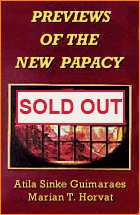 Special Edition |
